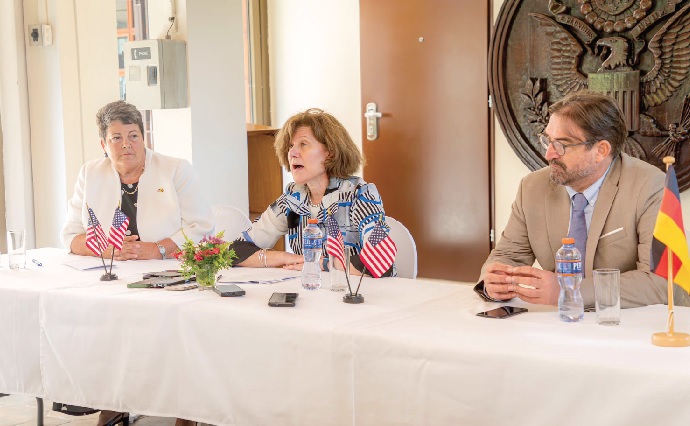
US, Germany launch $40m Coastal States Stability Mechanism programme
The Coastal States Stability Mechanism (CSSM), a United States-Germany regional initiative to strengthen stability in northern Ghana and the coastal West African countries of Benin and Togo, has been launched in Ghana.
The CSSM aligns with the Ghana National Framework for the Prevention and Countering of Violent Extremism and Terrorism and recognises that a community-oriented approach is required to address key drivers of instability and to mitigate the spread of Violent Extremist Organisations (VEOs).
Using a flexible small-grants mechanism to implement activities tailored to the local context, the CSSM intends to support government action to address localised drivers of instability by expanding and improving the delivery of critical services and supporting community efforts to improve social and economic conditions.
The initiative has already been launched in Benin and Togo and Ghana’s was jointly launched in Yendi in the Northern Region, by the US Assistant Secretary of State for Conflict and Stabilisation Operations, Anne Witkowsky; the US Ambassador to Ghana, Virginia Palmer, and the German Director General for Crisis Prevention, Stabilisation, Peacebuilding and Humanitarian Assistance, Deike Potzel. It will reinforce civilian security provision in areas under threat of violent extremism.
Project funding
The $40 million CSSM project which is funded by the United States Agency for International Development (USAID) and the German Federal Foreign Office (GFFO) is being piloted from April 2023 to April 2026 and will be implemented by the International Organisation for Migration (IOM) in coordination with the country’s Ministry of National Security and its Counter-Terrorism Fusion Centre, local government institutions and community partners.
The initiative aims to reinforce security, promote community cohesion, improve the capacity and legitimacy of government representatives and services, and advance social and economic development.
Violent Extremist Organisations (VEOs) operating in the Sahel are expanding their influence across borders into the northern regions of Coastal West Africa and destabilising factors such as limited state service delivery, a lack of economic prospects, and long-standing patterns of ethnic exclusion have exacerbated the threat.
Destabilising factors
While northern Ghana has shown resilience to violent extremist activity to date, its vulnerability is heightened by a range of destabilising factors, including limited state service delivery, a lack of economic prospects, communal conflicts aggravated by land and chieftaincy disputes, long-standing patterns of ethnic exclusion, and tensions ahead of the December general election.
The government of Ghana is responding to these threats with an attentive and proactive posture, aiming to enhance security and bolster stability in areas at risk of encroachment by VEOs. The coastal states' governments targeted response to regional instability through political, security and development initiatives requires additional support.
The CSSM's Ghana programme is grounded in a commitment to reinforce the agency of local communities and their representatives, including vulnerable and marginalised segments of the population.
CSSM began programming in Ghana in June 2024 and is currently implementing 11 activities in three border districts in the North East Region, including Chereponi, Yunyoo-Nasuan and Bunkpurugu-Nakpanduri, all with relative proximity to CSSM intervention areas in northern Togo.
Conflict prevention
In collaboration with its counterparts at the local and national levels, CSSM will strategically expand to districts in the Savannah and Upper West Regions in October, with an eventual expansion anticipated in the Upper East Region as a flexible conflict prevention instrument. CSSM's priority areas will evolve in concert with the government to respond to emerging developments, with priority given to areas that are both at high risk of VEO expansion and offer sufficient safety, accessibility and pathways to promote stability.
Ghana's Chereponi District, home to approximately 90,000 people, borders Togo's Savanes Region and struggles with local conflicts centred around land and chieftaincy disputes. These communal conflicts, which often persist along ethnic lines, have a wide-reaching impact on daily life, limiting freedom of movement and the delivery of basic services, and aggravating perceptions of social and economic exclusion.
Chereponi District
Some essential equipment were donated to the Chereponi District Hospital and the District Police Service, whose police station is currently being rehabilitated as part of the programme and this initial effort will fund the installation of 50 solar street lights in the Wenchiki and Dambu communities, personal protective equipment for the Police Service, a backup solar power system and blood bank refrigerators for the district’s only hospital.
It will also fund a trauma counselling and a Peace Durbar for community stakeholders, and high school debate and quiz competitions centred on peacebuilding, conflict resolution and ethnic diversity.
Beyond the initial focus on Chereponi, the CSSM programme will expand to select districts in the Upper West and Upper East regions with programmes and support designed for the needs of those communities.
The US Assistant Secretary of State noted that the CSSM project marked an important step forward in its partnership with Ghana as they worked together to enhance resilience and security across coastal West Africa in the face of regional threats as Ghana stood out as a leader in the region and the “United States is proud to support the country’s security efforts”.
Promote stability
The CSSM, according to her, was part of a broader US Strategy to Prevent Conflict and Promote Stability (SPCPS) in coastal West Africa and beyond and reiterated that through the strategy, the US was seeking to enhance social cohesion, improve government responsiveness and support security.
“Through these initiatives, we aim to create lasting impacts that contribute to a more secure and resilient Ghana and the region. When Africa succeeds, the world succeeds,” Ms Witkowsky said and further emphasised the importance of CSSM and the broader US commitment to promoting stability and preventing violent extremism in West Africa.
